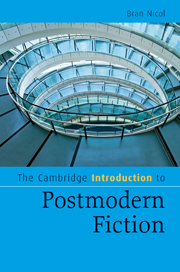Book contents
- Frontmatter
- Contents
- Acknowledgements
- Preface: reading postmodern fiction
- Introduction: postmodernism and postmodernity
- Chapter 1 Postmodern fiction: theory and practice
- Chapter 2 Early postmodern fiction: Beckett, Borges, and Burroughs
- Chapter 3 US metafiction: Coover, Barth, Nabokov, Vonnegut, Pynchon
- Chapter 4 The postmodern historical novel: Fowles, Barnes, Swift
- Chapter 5 Postmodern-postcolonial fiction
- Chapter 6 Postmodern fiction by women: Carter, Atwood, Acker
- Chapter 7 Two postmodern genres: cyberpunk and ‘metaphysical’ detective fiction
- Chapter 8 Fiction of the ‘postmodern condition’: Ballard, DeLillo, Ellis
- References
- Index
- Cambridge Introduction to …
Preface: reading postmodern fiction
Published online by Cambridge University Press: 05 June 2012
- Frontmatter
- Contents
- Acknowledgements
- Preface: reading postmodern fiction
- Introduction: postmodernism and postmodernity
- Chapter 1 Postmodern fiction: theory and practice
- Chapter 2 Early postmodern fiction: Beckett, Borges, and Burroughs
- Chapter 3 US metafiction: Coover, Barth, Nabokov, Vonnegut, Pynchon
- Chapter 4 The postmodern historical novel: Fowles, Barnes, Swift
- Chapter 5 Postmodern-postcolonial fiction
- Chapter 6 Postmodern fiction by women: Carter, Atwood, Acker
- Chapter 7 Two postmodern genres: cyberpunk and ‘metaphysical’ detective fiction
- Chapter 8 Fiction of the ‘postmodern condition’: Ballard, DeLillo, Ellis
- References
- Index
- Cambridge Introduction to …
Summary
The commonest complaint about the narratives of Beckett or Burroughs is that they are hard to read, they are ‘boring’. But the charge of boredom is really hypocritical. There is, in a sense, no such thing as boredom. Boredom is only another name for a certain species of frustration. And the new languages which the interesting art of our time speaks are frustrating to the sensibilities of most educated people.
Susan Sontag, ‘One Culture and the New Sensibility’ (1965)Sometimes I suspect that good readers are even blacker and rarer swans than good writers.…Reading, obviously, is an activity which comes after that of writing; it is more modest, more unobtrusive, more intellectual.
Jorge Luis Borges, Preface to A Universal History of Infamy (1935) (trans. Norman Thomas di Giovanni, 1972)In an essay about postmodern fiction a student once declared that Beckett's writing ‘doesn't go down easily’. As I was the marker, I had to point out that this phrase was not exactly appropriate academic discourse. But I could also see her point. If reading Jane Austen is like having a nice Sunday lunch, and The Da Vinci Code is the equivalent of a McDonald's, then reading Beckett is, for some, like being asked to complete the ‘Bushtucker Trial’ in the TV show I'm A Celebrity…Get Me Out Of Here.
Besides the parallel between literature and food, her statement implied a definition of fiction. A novel should be something accessible, easy to read. Literature should be digestible.
- Type
- Chapter
- Information
- The Cambridge Introduction to Postmodern Fiction , pp. xiii - xviiiPublisher: Cambridge University PressPrint publication year: 2009

